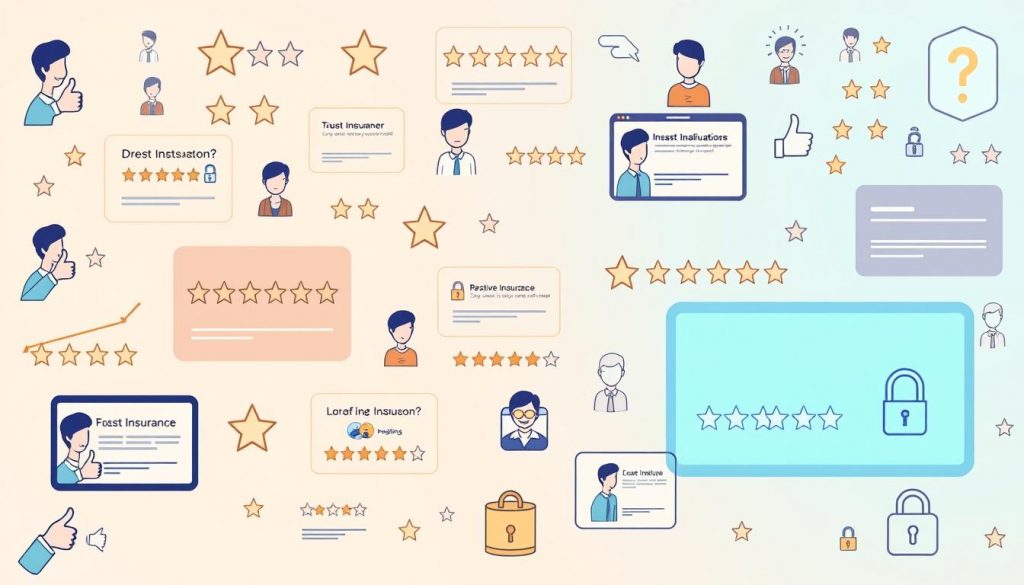In the world of insurance, comparing quotes can save you a lot of money. You can find better coverage that fits your needs. Whether it’s for your car, home, or life, getting quotes from different providers is key.
Online tools and trusted sites can help you find the best deals. The Insurance Information Institute says to compare at least three auto insurance quotes. This helps you avoid paying too much.
Tools like GEICO’s coverage calculator can help you understand your options. Many people save over $200 a year by comparing quotes. It’s worth the effort to find affordable insurance that fits your life.
Key Takeaways
- Comparing at least three auto insurance quotes is recommended for informed decisions.
- Utilizing online tools can simplify the comparison process.
- Customer testimonials indicate significant savings when switching to GEICO.
- Ensure all quotes have equivalent coverages to make accurate comparisons.
- Many customers report ongoing savings through comparative tools like Insurify.
Understanding Insurance Quotes
When looking for the best insurance, it’s key to understand insurance quotes. These quotes show what a policy might cost based on your info. Your personal details and property specifics are used in complex algorithms by insurance companies.
What Are Insurance Quotes?
Insurance quotes are what insurers offer to show how much a policy might cost. When you ask for quotes, the company looks at your info. They check things like coverage limits, deductibles, and any extra policy features. Each company’s quote can be different because of their own rules.
How Insurance Quotes Work
To get a quote, you give details about what you need and your personal situation. The company uses this info in their algorithms to make an estimate. Sometimes, they might find more risks after the quote, which could change the offer. It’s important to give accurate info to get a good estimate.
The Importance of Comparing Quotes
It’s crucial to compare different insurance quotes. This lets you see what each company offers and what they charge. Look at things like discounts and how they handle claims. Since each company has its own way of setting rates, some quotes might be cheaper than others. Choosing the right one can save you a lot of money.
| Insurance Type | Key Considerations | Common Factors Impacting Quotes |
|---|---|---|
| Home Insurance | Dwelling coverage, deductibles, and endorsements | Home size, location, prior claims |
| Auto Insurance | Liability, collision, and comprehensive coverage | Driving record, vehicle model, annual mileage |
| Health Insurance | Coverage types and premium costs | Tobacco use, health history |
| Life Insurance | Policy amounts and terms | Age, health metrics, remaining mortgage |
Types of Insurance You Can Compare
Knowing about different insurance types helps you choose wisely. By comparing policies, you can get great coverage at good prices. Let’s explore the insurance options you can compare.
Auto Insurance Quotes
Looking for auto insurance quotes? Think about your driving record, car type, and where you live. Many insurers offer discounts for safe driving and bundling policies. Online tools can make comparing easier and faster. Rates change a lot based on your situation, so comparing is key.
Homeowners Insurance Quotes
Getting homeowners insurance quotes means looking at your home’s value and what coverage you need. Insurers offer various options, like earthquake insurance and coverage for renters. Comparing rates from different companies helps you find good deals without losing important coverage.
Health Insurance Quotes
Health insurance quotes can be tricky because of all the plans and prices. Premiums depend on your age, health, and what you need, like family plans. Knowing your health needs helps you find the best coverage and price.
Life Insurance Quotes
Life insurance quotes help you figure out how much coverage your family might need. Think about your age, health, and financial duties. Comparing policies lets you choose between term and whole life insurance, ensuring you meet your financial goals.
| Type of Insurance | Key Factors for Quotes | Discount Opportunities |
|---|---|---|
| Auto Insurance | Driving record, vehicle type, location | Safe driving programs, multi-policy discounts |
| Homeowners Insurance | Home value, location, coverage needed | Bundling policies, home security systems |
| Health Insurance | Age, health status, coverage type | Employer-sponsored plan participation, healthy lifestyle discounts |
| Life Insurance | Age, health history, financial obligations | Annual reviews, lifestyle changes |
Factors Influencing Insurance Quotes
It’s important to know what affects your insurance quotes. Many factors can change the rates you get. Understanding these can help you find more affordable insurance.
Personal Information
Your personal details are key in getting insurance quotes. Your age, driving history, and credit score matter a lot. For example, young drivers under 25 often pay more because they’re less experienced.
Drivers with bad credit scores (below 580) might pay up to 69% more. Being married can also lower your rates. Married people are seen as more responsible, which can lead to cheaper insurance.
Coverage Options
The choices you make about coverage affect your premium. Picking higher deductibles can lower your monthly costs but means you’ll pay more out of pocket if you need to make a claim. Different coverage types, like liability only versus full coverage, also change your rates.
Insurers might see low liability limits as a higher risk. This can make your premiums go up.
Location-Based Factors
Where you live greatly affects your insurance rates. Cities usually have higher rates because of more accidents, theft, or claims. States also vary a lot; for example, Florida’s average is $3,945 a year, while Vermont’s is about $1,353.
Your zip code can give clues about the risks in your area. This can impact how affordable your insurance is.
How to Gather Insurance Quotes Effectively
To get the best insurance quotes, use different methods. Online tools, insurance agents, and direct company contact are key. Each method helps find quotes that fit your needs well.
Online Comparison Tools
Online tools let you get insurance quotes fast from many providers. They save time by letting you input your info once. These tools also show coverage details and policy costs. Many people like the ease of getting free insurance quotes online.
Working with Insurance Agents
Insurance agents offer personalized service and deep knowledge. They give quick insurance quotes based on your situation. They explain policy details and any discounts you might get, like for being claim-free.
Directly from Insurance Companies
Talking directly to insurance companies gives you quotes from the source. This way, you get full details on policies and any special deals. Companies like State Farm or Geico can show how their coverage meets your needs. Try to get quotes from at least three companies for a good comparison.
| Method | Advantages | Disadvantages |
|---|---|---|
| Online Comparison Tools | Fast, convenient, multiple quotes in one place | Limited personalization, may not cover all details |
| Insurance Agents | Personalized service, expert advice, potential discount insights | May involve higher costs, dependent on agent availability |
| Direct from Insurance Companies | Direct information, insights on promotions, clarification | Time-consuming, limited to one company’s offerings at a time |
Using these methods helps you get the right information. This way, you can make smart choices about your insurance.
Tips for Comparing Insurance Quotes
Finding the right insurance provider is more than just looking at prices. You need to check different parts of the policy. These tips will help you make smart choices and get good value for your money.
Look Beyond Price
It’s easy to pick the cheapest option when comparing insurance quotes. But, cheaper policies might not cover everything or offer good service. Choosing based only on price can lead to surprises later.
Check Policy Exclusions
It’s important to know what’s not covered by your policy. Some policies might not cover natural disasters or certain events. Make sure you understand what’s excluded to find the right policy for you.
Consider Customer Service Ratings
Customer service ratings show how reliable an insurance company is. Good ratings mean they care about their clients and handle claims well. Checking these can help you choose the best insurance.
Common Mistakes When Comparing Quotes
When comparing insurance quotes, it’s key to avoid common mistakes. Knowing these can save you time and money. It helps you pick a policy that fits your needs well.
Focusing Solely on Price
Many people only look at the price of insurance quotes. While it’s important to save money, don’t forget about the coverage. A cheaper policy might not cover you enough, leading to unexpected costs.
Ignoring Policy Coverage
It’s easy to overlook important details in policy coverage. Make sure to check what each quote includes. Look at coverage limits, exclusions, and extra benefits. Skipping this can lead to choosing a policy that doesn’t protect you when you need it most.
Underestimating Deductibles
Deductibles play a big role in your insurance costs. Many people don’t think about how different deductibles affect premiums. A low deductible might seem good, but it can mean higher premiums. On the other hand, a higher deductible can save you money on monthly payments.
The table below shows how deductibles can change your insurance costs:
| Deductible Amount | Monthly Premium | Annual Cost |
|---|---|---|
| $300 | $150 | $1,800 |
| $500 | $135 | $1,620 |
| $1,000 | $90 | $1,080 |
By understanding these common mistakes, you can better navigate the insurance world. This way, you can get the coverage you need without spending too much. Knowing these pitfalls can save you money and ensure better protection in the long run.
Understanding Policy Terminology
It’s key to understand insurance terms to make smart choices. Knowing about premiums, deductibles, and copayments helps you find good deals. Also, knowing what’s covered and what’s not helps you pick the right policy.
Premiums Explained
Your premium is what you pay for your insurance, usually monthly or yearly. It changes based on coverage type, your risk, and the company. Check your policy’s declarations page to see what you’re paying for and what’s included.
For example, an auto insurance page shows your vehicle details, the premium, and deductibles.
Deductibles and Copayments
A deductible is what you pay before insurance kicks in. It’s often around $500 for auto insurance. A copayment is a set amount for certain services, like doctor visits in health insurance.
Knowing these terms is vital because they impact your costs when you make a claim.
Coverage Limits and Exclusions
Coverage limits are the max your insurer pays for a loss. Knowing these limits, like 100/300/50 for liability, ensures you’re not under-insured. Exclusions list what’s not covered, like flood damage in homeowners insurance.
The Role of Credit Scores in Insurance Quotes
Your credit score is key in getting insurance quotes. Insurers use it to see how risky you are. This affects how much you pay for insurance a lot.
Most insurers, 92%, look at your credit score for auto insurance. A good score can lower your rates. But a bad score can make your premiums go up a lot.
How Credit Affects Your Rates
Insurers check your payment history and credit types to make your insurance score. This score shows how likely you are to make big claims. People with bad credit pay a lot more for car insurance.
For example, those with poor credit pay about $4,801 a year. But those with excellent credit only pay around $2,200. This shows how much a good credit score can save you.
Improving Your Credit Score for Better Quotes
Getting better insurance quotes starts with a good credit score. First, check your credit report for errors. Then, pay bills on time and cut down your debt.
By taking care of your credit, you can get lower insurance rates. It’s a smart way to save money.
Seasonal Changes and Insurance Quotes
Seasonal changes can greatly affect your insurance needs. It’s important to understand how these changes impact your coverage and costs. Getting new insurance quotes is key to keeping your policies up to date.
When to Seek New Quotes
It’s wise to review your insurance every year, especially if you have a seasonal business. The best time to look for new quotes is before the busy season starts. This is when you should check if your current coverage still fits your needs.
- Expanding your services.
- Hiring additional staff.
- Purchasing new equipment.
Seasonal Risks and Rate Changes
Each season brings its own set of risks that can change your insurance rates. For example, extreme weather events can lead to higher costs. In 2023, these disasters cost over $92 billion in the U.S.
Insurers expect a 22% rise in auto insurance by the end of the year. This will especially affect states like California, Missouri, and Minnesota, where rates could jump by 50%.
If you only use your vehicle in certain seasons, adjusting your coverage can save you money. Consider dropping comprehensive coverage when your vehicle is not in use. This can help lower your premiums.
| Adjustment Type | Details | Potential Savings |
|---|---|---|
| Dropping Comprehensive Coverage | Eliminating coverage for non-collision scenarios while not in use. | Reduces overall premiums. |
| Seasonal Adjustments | Changing coverage levels based on vehicle usage. | Offsets costs during periods of non-use. |
| Limit Liability Coverage | Scaling back coverage during slower months. | Cost-effective during less active seasons. |
McGee & Thielen Insurance Brokers are experts in helping seasonal businesses. They make sure you have the right coverage while keeping costs down.
Customer Reviews: A Key to Choosing the Right Insurance
When looking for the right insurance, customer reviews are key. They give insights into a company’s performance and service. This helps you decide if an insurer is trustworthy and meets your needs.
Why Reviews Matter
Customer reviews shape your view of an insurance company. They share real experiences, unlike marketing materials. Reviews often talk about:
- Claims processing speed: How fast and well claims are handled.
- Customer support quality: How helpful and knowledgeable the support team is.
- Policy fulfillment: If the insurer keeps their promises as stated in the policy.
Where to Find Reliable Reviews
Finding good sources for reviews is important. Look for them on:
- Insurance comparison websites: These sites have ratings and reviews from many people.
- Consumer advocacy organizations: Groups that ask clients about their insurance experiences.
- Social media and forums: Feedback from real customers talking about their experiences.
Looking at customer reviews helps you spot issues and make smart choices. By checking out what others say, you can find an insurer that offers good coverage for you.
Making the Final Decision on Insurance Quotes
Choosing the right insurance can feel overwhelming. But, by comparing quotes carefully, you can make it easier. Look at the premiums, coverage, and customer service of each insurer. This way, you pick a policy that fits your needs and budget well.
Evaluating Your Options
When you have several quotes, examine each policy’s features closely. Check the deductibles, coverage limits, and extra benefits. Think about your personal situation and what you need from your insurance. This careful look helps you understand the savings and coverage you’ll get.
Finalizing Your Insurance Policy
After picking a policy, make sure to finalize it correctly. Read the terms carefully to know your and the insurer’s duties. It’s smart to review your insurance every year.
Changes in the market or your life might affect your insurance needs. An annual review can show if your policy still meets your needs. It might also reveal ways to save or get better coverage.
FAQ
What are insurance quotes?
Insurance quotes are estimates from insurance companies based on your info and coverage needs. They help you find the best option for you.
Why is it important to compare insurance quotes?
It’s important because rates vary between companies. By comparing, you can find the best deal for your situation.
How can I get insurance quotes quickly?
Use online tools to get quotes fast. You can also contact companies or agents for personalized quotes.
What factors influence my insurance quotes?
Your age, driving record, coverage choices, and location matter. Each company weighs these differently, affecting prices.
How do credit scores affect insurance quotes?
Credit scores play a role in quotes. Better scores mean lower rates. Improving your score can help you get better quotes.
What types of insurance can I compare quotes for?
You can compare quotes for auto, homeowners, health, and life insurance. Each has its own savings potential.
Should I focus only on price when comparing insurance quotes?
No, price is just one factor. Check policy details and customer service to ensure you’re getting the right coverage.
What common mistakes should I avoid when comparing insurance quotes?
Avoid focusing only on price and ignoring policy details. Don’t underestimate the impact of deductibles. Always review each quote carefully.
How can I stay informed about my insurance policy needs over time?
Review your policies annually. This ensures you have the right coverage and can save money. Adjust your policies as your life changes.
Where can I find reliable customer reviews for insurance providers?
Look for reviews on consumer platforms, forums, and insurance rating websites. They offer insights into claims and customer service.


